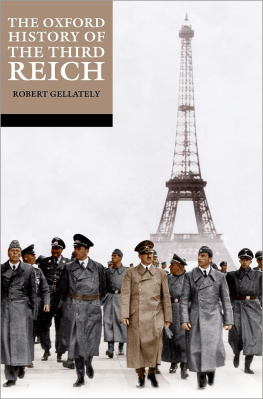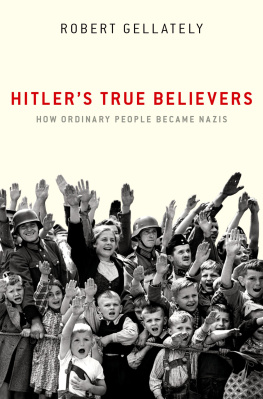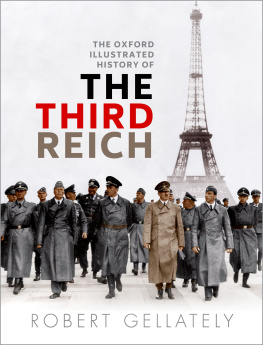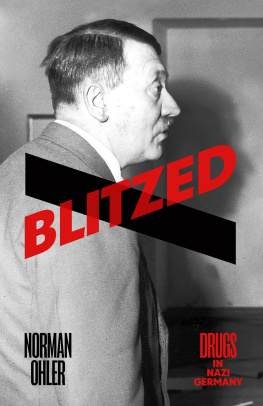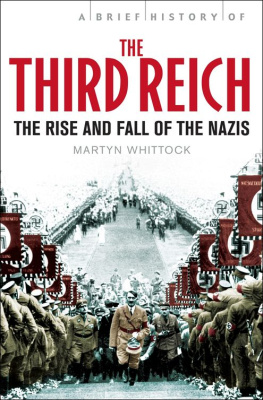The Oxford History of the Third Reich
Robert Gellately is Earl Ray Beck Professor of History at Florida State University. His publications have been translated into over twenty languages and include the widely acclaimed Lenin, Stalin, and Hitler: The Age of Social Catastrophe (2007), Backing Hitler: Consent and Coercion in Nazi Germany, 19331945 (2001), and Stalins Curse: Battling for Communism in War and Cold War (2013), the last two also published by Oxford University Press. He lives in Tallahassee, Florida.
The historians who contributed to The Oxford History of The Third Reich are all distinguished authorities in their field. They are:
OMER BARTOV , Brown University
HERMANN BECK , University of Miami
DAVID F. CREW , The University of Texas at Austin
ROBERT GELLATELY , Florida State University
PETER HAYES , Northwestern University
RALPH JESSEN , University of Cologne
JONATHAN PETROPOULOS , Claremont McKenna College
DIETER POHL , AlpenAdriaUniversitt Klagenfurt
HEDWIG RICHTER , Hamburg Institute for Social Research
MATTHEW STIBBE , Sheffield Hallam University
JULIA S. TORRIE , St. Thomas University

Great Clarendon Street, Oxford, OX2 6DP, United Kingdom
Oxford University Press is a department of the University of Oxford. It furthers the University's objective of excellence in research, scholarship, and education by publishing worldwide. Oxford is a registered trade mark of Oxford University Press in the UK and in certain other countries
Oxford University Press 2023
Copyright in the Introduction and Chapter 10 Robert Gellately 2018
All rights reserved
The text of this edition was published in The Oxford Illustrated History of the Third Reich in 2018
The moral rights of the author have been asserted
First Edition published in 2018
Second Edition published in 2023
Impression: 1
All rights reserved. No part of this publication may be reproduced, stored in a retrieval system, or transmitted, in any form or by any means, without the prior permission in writing of Oxford University Press, or as expressly permitted by law, by licence or under terms agreed with the appropriate reprographics rights organization. Enquiries concerning reproduction outside the scope of the above should be sent to the Rights Department, Oxford University Press, at the address above
You must not circulate this work in any other form and you must impose this same condition on any acquirer
Published in the United States of America by Oxford University Press
198 Madison Avenue, New York, NY 10016, United States of America
British Library Cataloguing in Publication Data
Data available
Library of Congress Control Number: 2022951168
ISBN 9780192886835
ebook ISBN 9780192886859
DOI: 10.1093/oso/9780192886835.001.0001
Printed and bound in the UK by Clays Ltd, Elcograf S.p.A.
Links to third party websites are provided by Oxford in good faith and for information only. Oxford disclaims any responsibility for the materials contained in any third party website referenced in this work.
Contents
Praise for The Oxford History of the Third Reich
Having assembled an impressive group of experts, the volume proceeds thematically to address almost every aspect of the Third Reich. All ten chapters are well informed by contemporary scholarship but accessible to a lay audience. Politics, culture, war, society, and economy all receive their due.
Robert Dassanowsky, Journal of Modern History
For a reader who wishes to choose one source to learn about the Third Reich this book is a good choice.
Paul Bookbinder, European History Quarterly
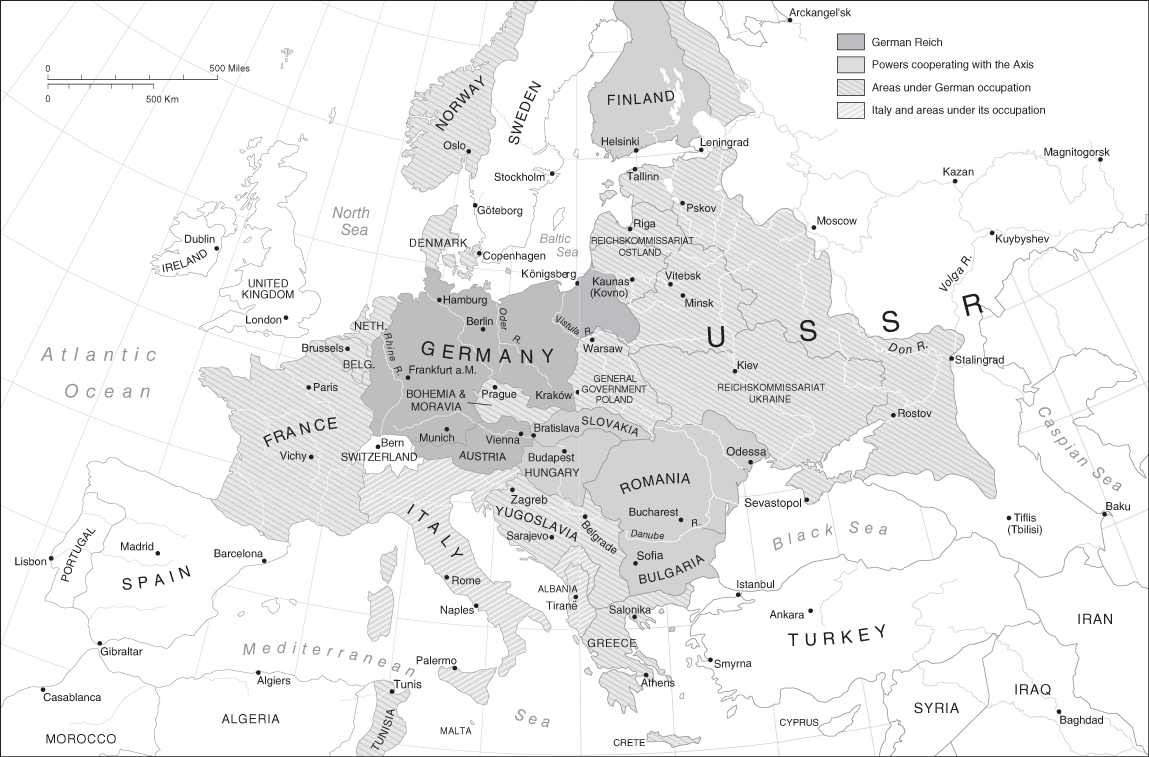
0.1 Europe under German domination in 1942 (courtesy of Robert Gellately).
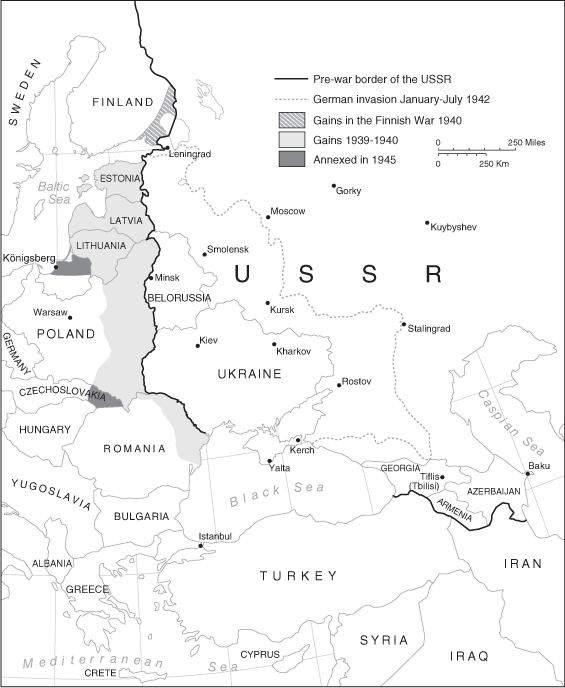
0.2 Western USSR and territorial acquisitions under Stalin (courtesy of Robert Gellately).
Historians today continue raising questions about the Third Reich, especially because of the unprecedented nature of its crimes, and the military aggression it unleashed across Europe. Much of the inspiration for the catastrophic regime, lasting a mere twelve years, belongs to Adolf Hitler, a virtual nonentity in political circles before 1914.
He had been born in 1889 and was not even a German citizen. Moreover, during his largely normal youth in AustriaHungary, he revealed no signs of his future, and by age 20 he was a drifter with little education and socially withdrawn. He had no passionate ambitions save to become an artist of some kind, a vocation for which he had no formal training. He dabbled in painting, vaguely aspired to become a designer of the sets for the operas he adored, yet on that score, he made no progress whatsoever, and in the autumn of 1909, he hit rock bottom when he landed in a Viennese homeless shelter. In February the next year, he left to take residence in a mens hostel, where he stayed for just over three years, when in May 1913, thanks to receiving a tidy sum of money that was due from his fathers inheritance, the artist Adolf Hitler left for Munich, with dreams of becoming an architect. Once more, however, he made few friends, could find no work, and again had to paint postcards to get by. He appeared doomed never to achieve much of anything, given the existing order with its rigid class and political structures that allowed relatively little social mobility. But then the coming of what would be the Great War in 1914 turned the world upside down. The prospect of fighting for Germany excited this young mans nationalism, as it did for millions of others in nearly all parts of the globe, and he soon volunteered. The war would have revolutionary consequences, driving out the old orders, and ultimately making it possible even for social outsiders such as him to entertain lofty ambitions.
However, in November 1918, on his return from the war lost by Germany, we have no evidence that Hitler dreamed of becoming some kind of revolutionary leader, and his ambition was the more modest one of staying in the army as long as he could. Like so many in Germany, he was convinced that the Home Front had betrayed the undefeated army, had stabbed it in the back, and, like millions of others, he would believe in this legend for the rest of his life.
At age 30, he could count practically no accomplishments and he remained a rootless loner, a corporal in the shattered army, with no money and few prospects. However, he soon attracted the attention of officers on the lookout for enlisted men they could train to address the demobilizing troops with nationalist messages. During the brief schooling that followed, Hitler did quite well. In the course of 1920, he helped found a new political entity, the National Socialist German Workers Party (NSDAP), or Nazi Party. He quickly became its leading figure, though the ragtag operation was only one among the dozens like it on the political landscape of the dispirited country.

